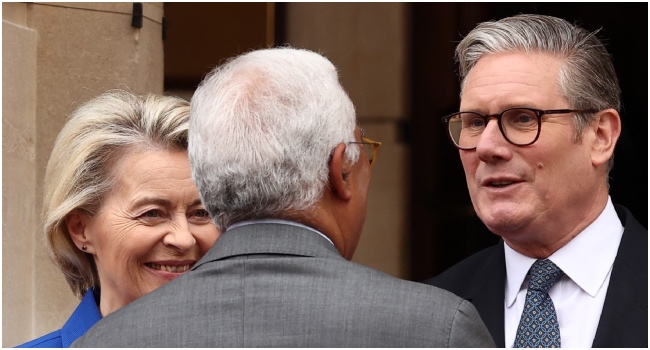
UK Prime Minister Keir Starmer was poised to sign a major agreement deepening ties with the European Union at a high-stakes summit on Monday, signaling a fresh start in UK-EU relations five years after a bitter Brexit.
According to EU diplomats, a deal was finalized late Sunday following intense negotiations to bridge differences on key issues, including defence cooperation and fishing rights.
EU member states have endorsed three documents expected to be signed at the summit, with the centerpiece being a new “Security and Defence Partnership.” A late breakthrough also paved the way for an agreement on fishing access — a long-standing sticking point.
Since taking office in July 2024, Starmer’s Labour government has prioritized rebuilding the UK’s relationship with Europe. Labour argues that the existing Brexit deal, brokered by the previous Conservative administration, is failing both sides.
While pushing for closer cooperation, Starmer has maintained key red lines — notably ruling out rejoining the EU single market or customs union. Critics in the Conservative Party have labeled the new negotiations a “capitulation,” though Starmer insists the aim is a pragmatic reset.
A source close to the talks told AFP, “There was a breakthrough last night, but some steps remain.”
At Monday’s summit, Starmer is expected to meet European Commission President Ursula von der Leyen, European Council President Antonio Costa, and EU foreign policy chief Kaja Kallas. The leaders will formalize the defence agreement and issue two other documents: a joint statement of European solidarity and a Common Understanding covering trade, fishing, and youth mobility.
Under the final accord, the UK will grant European fishing vessels continued access to British waters for 12 years after the current deal ends in 2026. In return, the EU will relax long-standing restrictions on food imports from the UK, easing customs-related delays that have plagued cross-border trade.
Youth mobility — a contentious topic due to concerns about restoring full freedom of movement — remains unresolved. Negotiators agreed to broad language, deferring detailed terms to future discussions.
The talks come amid heightened concerns about European security, spurred by Russia’s aggression in Ukraine and uncertainty over U.S. support under President Donald Trump. The new defence partnership is expected to include more regular UK-EU security consultations, British participation in EU military missions, and possible access to the EU’s upcoming €150 billion ($167 billion) defence fund.
While much of the framework will be hashed out in the months ahead, the UK’s existing NATO ties with 23 EU countries make defence cooperation one of the more straightforward aspects of the agreement.
Still, observers urged caution in expectations.
“This is a meaningful step forward, but not a final settlement,” said Olivia O’Sullivan, director of the UK in the World programme at Chatham House. “It signals greater cooperation, but many questions remain unresolved.”
Starmer has indicated a willingness to align more closely with EU standards, particularly on food and agricultural products, to ease trade frictions. Europe Minister Nick Thomas-Symonds, who led UK negotiations, highlighted the urgent need to reduce cross-border bureaucracy that has led to spoiled goods and delayed deliveries.
“We want to cut through the red tape,” Thomas-Symonds told the BBC, adding that the current certification processes are burdensome and ineffective.
Starmer has ruled out a return to full freedom of movement but is open to a narrowly defined youth mobility agreement that would allow limited opportunities for 18- to 30-year-olds from both sides to live, work, or study abroad.
Thomas-Symonds emphasized the need for any scheme to be “smart and controlled,” reflecting growing domestic pressures from right-wing Eurosceptic forces such as Nigel Farage’s Reform UK party.
He also confirmed that the UK is seeking expedited customs processing for British citizens traveling to the EU.
“We want British holidaymakers to enjoy their trips without being stuck in long queues,” he said.
